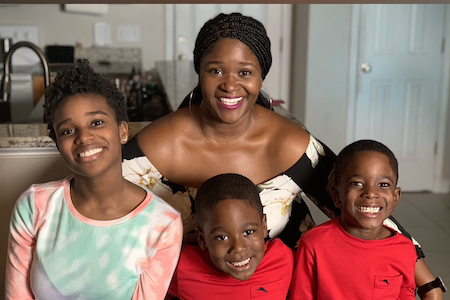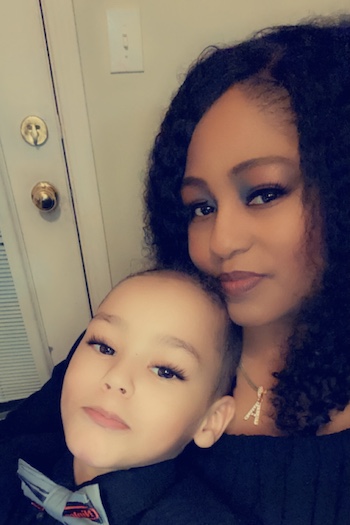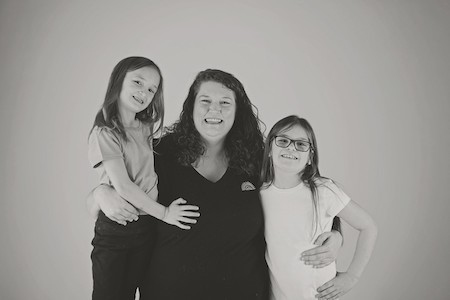Carissa Stevens’ twin sons are one big bundle of energy, but after their first birthday, it was apparent they were on two different paths. Elijah was meeting all the developmental milestones while Malachi was not. A battery of tests confirmed a diagnosis of autism spectrum disorder.
“We were totally blindsided even though we knew that something was different with Malachi,” Stevens recalls of that 2017 diagnosis. “We didn't know anyone who had children on the autism spectrum, and we didn't have any resources. We just didn't know what was next in our lives.”

Autism Parent Navigator Carissa Stevens with her children, from left, Lauryn, Elijah and Malachi.
Stevens and other family members started digging and happened upon a pilot study conducted by Robert Hock, a professor in the University of South Carolina’s College of Social Work. The study connected parents of newly diagnosed children with other parents who already had navigated the labyrinth of decisions that face every family with children on the spectrum.
“I had someone talking to me, understanding what I was experiencing, giving me some direction,” she says. “The emotional support was amazing, to have someone say, ‘I went through the same thing.’”
Malachi is now 8, and thanks to therapeutic intervention following his early diagnosis, he is in the same mainstream classroom with his neurotypical twin brother. Carissa Stevens has become a parent mentor in a large NIH-funded Autism Parent Navigator Program, also directed by Hock, which is testing the findings of the initial pilot study.
“This program is designed to support families shortly after they've learned that their child is diagnosed with autism,” says Hock, who is a affiliate faculty member with USC’s Center for Autism and Neurodevelopment. “It's delivered by experienced parents to parents to provide them with emotional support and help them understand what services are available and how to go about devoting family resources, time and talents to help their child have the best future they can have.”
Hock’s team has thus far recruited about 80 families for the program from 24 counties in South Carolina and plans to recruit 100 more families from the Palmetto State and from Pennsylvania and North Carolina through 2026. Children diagnosed on the autism spectrum in the study range in age from 18 months to 8 years.
Caregiving teams meet with parents for six sessions. Half of the participants will also get a more structured program of support that includes skill-building activities and a workbook.

“We’re hoping that parents in our program will be more confident in making decisions about their children with autism, more knowledgeable about services, less stressed and more hopeful than if they had to go it alone,” Hock says. “We want parents to not delay, to not have unnecessary conflicts and to get their children engaged in services earlier with an understanding of all the options. There is no one-size-fits-all treatment for autism, so each family needs to figure out what works best for their child.”
Anja Wilson, whose 8-year-old son Cortland is on the autism spectrum, says her experiences over the past several years inform her approach as a parent mentor in the Autism Parent Navigator program.
“None of us are clinical professionals,” she says. “We’re just experienced parents who have been navigating the diagnosis with our own children, and we’re here to help other parents find their way. When you first hear the words, ‘Your child is on the autism spectrum,’ it comes in like a wrecking ball.
“But parents we work with seem very appreciative. I hear things like, ‘The strategies and skills you’ve taught us — we never would have thought of doing this. We never would have known where to start.’”
Along with helping parents quickly become familiar with treatment options and other resources, the Autism Parent Navigator program promotes positive mental health for caregivers.

Laura Shugart and her daughters Madilyn, left, and Creelynn.
“As a parent, you will try to do what’s best for your child and you put that first. But sometimes we forget about taking care of ourselves and the relationship we have with a husband or a wife,” says Laura Shugart, a parent mentor in the program whose 8-year-old daughter Creelynn is on the autism spectrum. “I always tell the parents I’m working with, ‘Make time for little things, getting a cup of coffee or just sitting on the porch for few minutes together — do something that isn’t related to your child or your child’s diagnosis. It really makes a difference.”
Ultimately, Hock hopes that data collected from the study, including outcomes for the children and mental health markers for parents and family caregivers, will create a blueprint to launch similar programs across the country.
“We’re hoping our findings can become an evidence-based practice that could be used by non-specialized caregivers at parent support organizations in all 50 states,” Hock says. “It could result in far better outcomes than parents just trying to do it on their own.”
Find help
The Navigating Autism Spectrum Disorder: A Parent Support Research Study is accepting new families. Learn more at www.asdfamresearch.com.